#letter to a young woman poet
Text
Book Recommendations
Having accomplished my reading goal for the year a few hours shy of July, I stood up, stretched my limbs , gazed over the horizon and contemplated this feat which for some might be grand or small depending on perspective and experience. I had set out to read a hundred books for no particular reason other than to venture beyond the comforts of my literary habits.
In the course of the challenge, I read books that were inconsequential other than their placement of rank between one and the hundred of books, I would have read before the year's end.
Books that opened a string of connected doors that led me down rabbit holes of the wondrous nature of certain genres and book series. While others portaled open brief but exciting worlds whose wonder I wouldn't do justice if I tried to describe. Others conjured the feeling of a polyester and wool spun thread that is constantly scraping against teeth or furniture that is constantly dragged across uncovered floor.
Some were the intake of fresh breath after spending all day indoors, a well scratched itch in the middle of your back or taking a dump after holding it in all day. Some were familiar songs but sung a bit of key as if to draw in the heart but all they did was confuse the mind.
While I could not cover all the ways that the books made me feel, there was in them a feeling of getting a hundred handshakes. Each intricately different and unique but what I felt was a callouse here, a moist hand there, a firm grip, long fingers and huge hands that completely covered my hand or tiny ones that made me stop and stare.
Some of the books that I would recommend are :
1.On Earth We're Briefly Gorgeous by Ocean Vuong
2.Man's Search for Meaning by Victor Frankl
3.Letters to a Young Poet by Rainer Maria Rilke
4.A Woman is no Man by Etaf Rum
5.Giovanni's Room by James Baldwin
6.As a Man Thinketh by James Allen
7.Nearly all the Men in Lagos are Mad by Damilare Kuku
8.Frankenstein by Mary Shelly
9.A lady of Rooksgrave Manor by Kathryn Moon
10.Ikigai by Hector García and Fransesc Mirales
11.Love and other words by Christina Lauren
12.Heartstopper by Alice Oseman
Now I am embarking on another journey where the books are fewer but more likely to caress my soul. It's one of intention more than the numbers. The mystic in me wants to try 21 books in the hope that it will build a habit. But in all this, I am aware that, reading should be a fun chore like , washing the dishes while listening to music. The moment it starts to become a cumbersome chore, we should draw new strategies lest we fall out of love.
#reading#book reccs#book discussion#writing#on earth we're briefly gorgeous#giovannis room#A Woman Is No man#as a man thinketh#ikigai#heartstopper#A lady of Rooksgrave Manor#letters to a young poet#Nearly all of the men in lagos are mad#Frankenstein#man's search for meaning#love and other words#2022 books#reader insert
25 notes
·
View notes
Text

#Clara Westhoff#rainer maria rilke#sculptor#painter#poet#writer#letters to a young poet#poetry#art#german poetry#german art#woman artist
5 notes
·
View notes
Text

"Palestinian": new poem by the Palestinian poet Ibrahim Nasrallah (trans. Huda Fakhreddine), March 24, 2024.
"I was silent and nothing came of it.
I spoke and nothing came of it.
I cursed, I apologized, and nothing came of it.
I was busy, I pretended to be busy…and nothing.
I sat, I walked, I ran.
I shivered and I warmed up. Nothing.
I was parched until I cracked. I drank until I drowned, and nothing came of it.
I crumbled like a fetus, like the father, the siblings, and the mother.
I was then gathered in a shroud made of old curtains,
and nothing came of it.
I stumbled more than I could stand but then I stood up,
and nothing came of it.
I prayed until, like a prophet, I became a verse in a holy book,
I rowed until I reached hell,
I beseeched and begged …and nothing.
I raged, I calmed, I remembered what was once distant,
and I forgot what was always close.
I befriended a monster, and I fought a monster.
I died young and sometimes survived.
In both times, I grew old from all that I had seen,
but nothing came of it.
I charged, I withdrew,
I fought the wind when it blew,
And reconciled with the waves when I rose and raged.
Among the horses my heart was a horse,
in the night my heart was a night,
and nothing came of it.
I ate, I hungered, I vomited, and nothing came of it.
I embraced my shadow, and I chastised it and then I chastised myself.
I greeted a woman lost in the streets.
I fought with a man and his smile nearby,
and with a bird that sang briefly in the garden,
and nothing came of it.
I closed all the windows in my house and opened them.
I wrote words on death when it is merciful,
death when it is futile,
death when it is hell,
death when it is the only way…at last,
death when it is gentle and light,
death when it is heavy and dark,
and nothing came of it.
I wrote about the river and the sea, about tomorrow and the sun,
and nothing came of it.
I wrote about oppression and depravity – purity too.
I slept without a bite of bread.
I dreamt without dreams.
I woke up not missing my hands or feet or reflection in the mirror
or the thing I call my soul.
I died and lived. I lit myself on fire. I put myself out with my own ashes,
and nothing came of it.
I am all these elements, O God: fire, earth, wind, and water.
Their fifth is a pain that blind songs can’t see, their sixth is this immense
loneliness, and their seventh, since my slaughter, is blood.
When I burned, I inhabited the letters of my free name like a butterfly:
P A L E S T I N E
When my roof was suddenly blown off into the sky and with it a wall, a window,
and the youngest of my children,
I gathered myself in the G and the A and the Z and the A.
I became GAZA.
A thousand warplanes circled and hit me. I collapsed and collapsed again,
and then rose in a scream. I called out, but nothing came of it.
Nothing came of it.
Nothing came of it.
I lost faith and believed, lost faith and believed again,
and lost faith and believed and…
nothing came of it,
nothing came of it.
And the filthy world asks me:
All this…what of it?"
407 notes
·
View notes
Text
"Burginda’s letter is instructing the young man in his spiritual endeavours, and the contents of the (albeit short) letter reveal that she was highly educated and well-read. Written in a period that many still refer to erroneously as an intellectual ‘Dark Ages’, Burginda’s letter uses Greek words, utilises biblical exegesis, imitates Christian poetry like the fifth-century Psychomachia of Prudentius, and references both the sixth-century Italian poet Arator and the classical Roman poet Virgil. It also contains a reworking of a description of heaven found in a Latin poem from Africa that dates to c. 500. Burginda was clearly a very well-read intellectual.
This letter can be used as an example to refute many popular misconceptions about the early middle ages. The first misconception is that antique texts were neglected or unknown in this period. The second misconception is that medieval women were uneducated and unintellectual. The third misconception is that there was little or no intellectual transmission between Africa and Europe in this period. Burginda’s letter proves all these assumptions false. Not bad for two paragraphs of Latin."
#burginda#history#women in history#women's history#8th century#england#english history#female writers#herstory#middle ages#medieval#medieval women
446 notes
·
View notes
Text
𝑻𝑯𝑬 𝑻𝑼𝑫𝑶𝑹𝑺. all sentences have been taken from the showtime drama, the tudors. change names, locations, pronouns as you see fit. this is a redo of another meme.

“Without knowledge, life is not worth having.”
“I have come here to die. I die a Queen, but I would rather die the wife of Culpeper.”
“One day I shall lie beside you again, I promise and we shall sleep together for eternity.”
“Your Majesty's life is far too precious to be put at risk against such a common rabble.”
“Of course, if you choose to go, you'd be like a lion among wolves.”
“My friend, if all ambassadors were beautiful women I'd be serving my country day and night.”
“You hate him like a scorpion. And why? Because he would not satisfy your ambition.”
“Diplomacy is nearly always settled by such proximity.”
“I call Mary my English mare, because I ride her so often.”
“You are a poet as I am a woman. Poets and women are always free with their hearts, are they not?”
“There's something deep and dangerous in you, Anne, those eyes of yours are like dark hooks for the soul.”
“As a humanist I share your opinion. As a King, I'm forced to disagree.”
“Though I love Your Majesty and I'm loyal to you, in every way, I cannot disguise my distress and unhappiness.”
"I should only ever tell the king what he ought to do, not what he could do. For if the lion knows his own strength, no man could control him."
"Blessed lady, Queen of Hearts, there will be even greater crowds than these to welcome you when you return to London."
"For every scholar that votes for you...I could find a thousand who would vote for me."
"You and I are both young, and with God's grace, boys will follow."
"You have no one to blame but yourself for this.”
“I was a true maid without touch of men. And whether or not it be true, I put it to your conscience.”
"Seduce me. Write letters to me. And poems, I love poems. Ravish me with your words. Seduce me."
"I have never known another man....and nor would I ever want to."
"If I had to choose between extreme sorrow and extreme happiness, I would always choose sorrow, for when you are happy you forget about spiritual things, you forget about God.But in your sorrow, He is always with you."
"Chastity? You talk to me about chastity when you have a mistress and two children, your Eminence."
“This, I vow, that my eyes desire you above all things.”
“As a humanist I have an abhorrence of war. It's an activity fit only for beasts yet practiced by no kind of beasts so constantly as by man.”
“What if the King doesn't know what's in his best interests?”
“If you want to keep the love of a prince, this is what you must do: You must be prepared to give him the thing you most care for, in all the world.”
“Lady Anne is so beautiful, it is the duty of every man to love her. Of course I loved her, but from a distance.”
“You treat me so unkindly and in public neglect me.”
“My only satisfaction is that in frustrating you I hasten your fall from the King's good graces, an outcome I desire above all others.”
“Mistress Boleyn, you should not abuse the Queen's honor with such language!”
“He was a lion in my defense. Now he will die ashamed and alone in a prison cell.”
“Then here's the truth. You must shut your eyes and endure like your betters have done before you!”
“Don’t you know that I can drag you down as quickly as I raised you?”
“I am more convinced than ever that he is the agent of Satan. If I could, I would strip him from the King's side- and burn him.”
"I know of no Queen of England but my mother. And I will accept no Queen but my mother."
“If the King's mistress would intercede with him on my behalf, then I would be grateful."
"Lady, you must know how beloved you are to the people—as was your mother before you, God rest her soul."
“I'm a lot older than I was when I first knew you. And wiser.”
“have no heir. The Tudor Dynasty, all my father's work, finished, and it's MY fault!”
“He will tire of you, like all the others.”
“You know perfectly well what the King desires and what he shall have.”
“You can't have 3 people in a marriage!”
“I am surprised to receive such a request from such a wise and noble man as you.”
“ I am but a poor woman, lacking in both wit and understanding. How am I supposed to respond to such a request made to me out of the blue?”
“I know what you are trying to do, but do not think to take the King away from me. Let him play with you. Let him give you gifts. But he cannot give you his true heart.”
“I make you this promise. When we are married, I will deliver you a son.”
“I was wondering if you'd like to become my mistress.“
“The brat is now officially a bastard.”
“Everything will change for her. That kiss is her destiny and fortune.”
“People of England, your King is unharmed!”
“An important question, whether it is better for a king to be feared or loved.”
“I do imagine there are some at court who would like to see the Queen replaced.”
“Lady Bryan, if I cannot please the King, will he kill me?”
“For he who possesses the heir to the throne will very soon possess the throne itself.”
#rp meme#sentences memes#meme call#roleplay memes#sentence meme#( cali meme. )#rp memes#rp prompt#rp musings#roleplay prompt#roleplay meme
97 notes
·
View notes
Note
luthienne!! earlier this year i had a fainting episode - just passed out completely unconscious on public transport, and when i came to the tiniest bit i felt some stranger gently fireman-carrying me out onto the platform, and some woman draping her scarf under my head so i'd lie comfortably on the metal bench, and my muddy brain kept thinking 'the world has not forgotten you, it holds you gently in its palm' and anyways - WHERE is that quote from?? is it rilke?? i think i first read it here!
oh my god anon!! that sounds so scary, i hope you are doing ok now and i am so warmed to know that the people around you took care of you 💗 it is from rilke’s letters to a young poet:
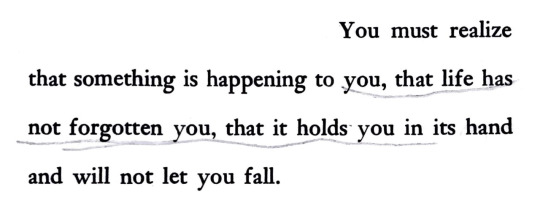
240 notes
·
View notes
Text
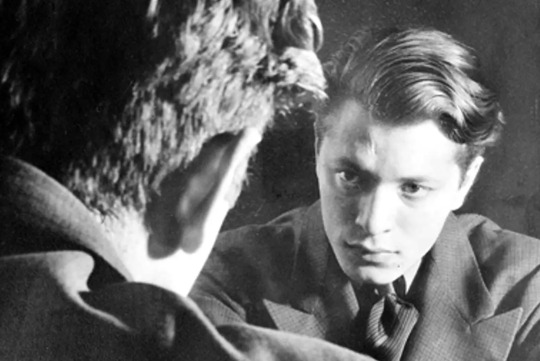
Poet Delmore Schwartz, New York City Uncredited and Undated Photograph
O Delmore how I miss you. You inspired me to write. You were the greatest man I ever met. You could capture the deepest emotions in the simplest language. Your titles were more than enough to raise the muse of fire on my neck. You were a genius. Doomed.
The mad stories. O Delmore I was so young. I believed so much. We gathered around you as you read Finnegans Wake. So hilarious but impenetrable without you. You said there were few things better in life than to devote oneself to Joyce. You’d annotated every word in the novels you kept from the library. Every word.
And you said you were writing “The Pig’s Valise.” O Delmore no such thing. They looked, after your final delusion led you to a heart attack in the Hotel Dixie. Unclaimed for three days. You—one of the greatest writers of our era. No valise.
You wore the letter from T.S. Eliot next to your heart. His praise of In Dreams. Would that you could have stopped that wedding. No good will come of this!!! You were right. You begged us—Please don’t let them bury me next to my mother. Have a party to celebrate moving from this world hopefully to a better one. And you Lou—I swear—and you know if anyone could I could—you Lou must never write for money or I will haunt you.
I’d given him a short story. He gave me a B. I was so hurt and ashamed. Why haunt talentless me? I was the walker for “The Heavy Bear Who Goes With Me.” To literary cocktails. He hated them. And I was put in charge. Some drinks later—his shirt undone—one tail front right hanging—tie skewed, fly unzipped. O Delmore. You were so beautiful. Named for a silent movie star dancer Frank Delmore. O Delmore—the scar from dueling with Nietzsche.
Reading Yeats and the bell had rung but the poem was not over you hadn’t finished reading—liquid rivulets sprang from your nose but still you would not stop reading. I was transfixed. I cried—the love of the word—the heavy bear.
You told us to break into __’s estate where your wife was being held prisoner. Your wrists broken by those who were your enemies. The pills jumbling your fine mind.
I met you in the bar where you had just ordered five drinks. You said they were so slow that by the time you had the fifth you should have ordered again. Our scotch classes. Vermouth. The jukebox you hated—the lyrics so pathetic.
You called the White House one night to protest their actions against you. A scholarship to your wife to get her away from you and into the arms of whomever in Europe.
I heard the newsboy crying Europe Europe.
Give me enough hope and I’ll hang myself.
Hamlet came from an old upper class family.
Some thought him drunk but—really—he was a manic-depressive—which is like having brown hair.
You have to take your own shower—an existential act. You could slip in the shower and die alone.
Hamlet starting saying strange things. A woman is like a cantaloupe Horatio—once she’s open she goes rotten.
O Delmore where was the Vaudeville for a Princess. A gift to the princess from the stage star in the dressing room.
The duchess stuck her finger up the duke’s ass and the kingdom vanished.
No good will come of this. Stop this courtship!
Sir you must be quiet or I must eject you.
Delmore understood it all and could write it down impeccably.
Shenandoah Fish*. You were too good to survive. The insights got you. The fame expectations. So you taught.
And I saw you in the last round.
I loved your wit and massive knowledge.
You were and have always been the one.
You can lead a horse to water but you can’t make him think.
I wanted to write. One line as good as yours. My mountain. My inspiration.
You wrote the greatest short story ever written.
In Dreams
-- Lou Reed, "Oh Delmore How I Miss You" 2012
----
*Autobiographical Character in several Schwartz works
21 notes
·
View notes
Text
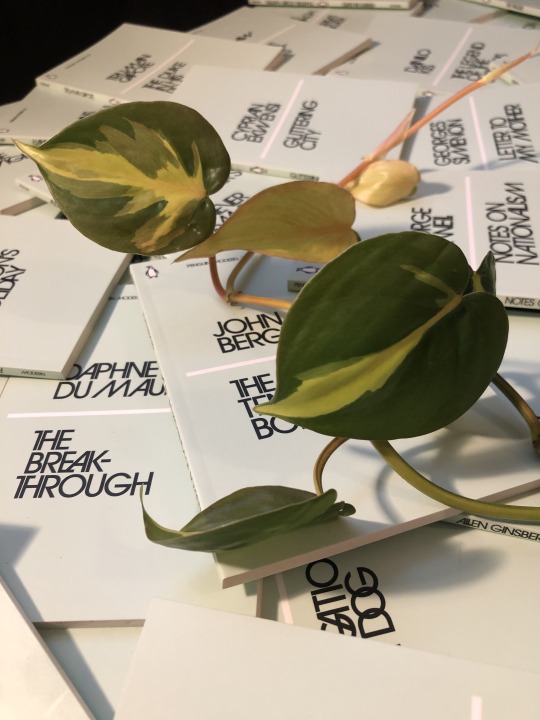
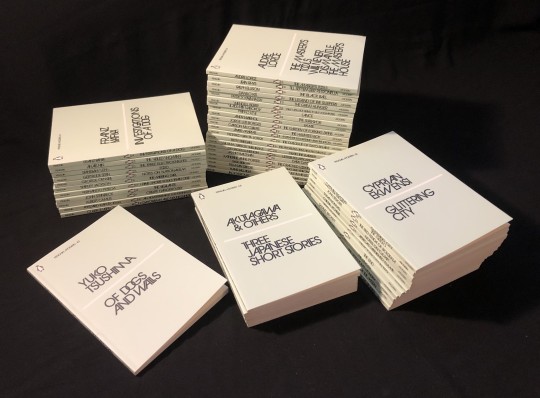

(I took these pictures myself)
Part 4
This is a collection of short stories, 50 penguin's modern classics. They were sold together so I've no idea if they're sold separately. I bought them back when Book Depository was still a thing :( this is one of the few times I bought brand new books instead of thrifting them, I splurged on it because I was given Eid money around that time ahaha
Titles in this set (summary taken from the backs of the books):
31. THE GIGOLO by FRANÇOISE SAGAN. A middle-aged woman breaks with her young lover; a husband is suspected of infidelity; a dying man reflects on his extramarital affairs, in these shimmering, bittersweet tales of desire and disillusionment.
32. GLITTERING CITY by CYPRIAN EKWENSI. Untrustworthy, charming Fussy Joe spins tall tales and breaks hearts in this rollicking story set in the 'sensational city' of 1960s Lagos.
33. PIERS OF THE HOMELESS NIGHT by JACK KEROUAC. Soaring, freewheeling snapshots of life on the road across America, from the Beat writer who inspired a generation.
34. WHY DO YOU WEAR A CHEAP WATCH? by HANS FALLADA. Darkly funny, streetwise tales of low-lifes, grifters and ordinary people trying to make ends meet in pre-War Germany.
35. THE DUKE IN HIS DOMAIN by TRUMAN CAPOTE. This mesmerizing profile of an insecure, vulnerable young Marlon Brando, brooding in a Kyoto hotel during a break from filming, is a peerless piece of journalism.
36. LEAVING THE YELLOW HOUSE by SAUL BELLOW. A stubborn, hard-drinking elderly woman living in a desert town finds herself faced with an impossible choice, in this caustically funny, precisely observed tale from an American prose master.
37. THE CRACKED LOOKING-GLASS by KATHERINE ANNE PORTER. A passionate, unfulfilled woman considers her life and her marriage in this moving novella by one of America's finest short story writers.
38. DARK DAYS by JAMES BALDWIN. Drawing on Baldwin's own experiences of prejudice in an America violently divided by race, these searing essays blend the intensely personal with the political to envisage a better world.
39. LETTER TO MY MOTHER by GEORGES SIMENON. Georges Simenon's stark, confessional letter to his dead mother explores the complexity of parent-child relationships and the bitterness of things unsaid.
40. DEATH THE BARBER by WILLIAM CARLOS WILLIAMS. Filled with bright, unforgettable images, the deceptively simple work of William Carlos Williams revolutionized American verse, and made him one of the greatest twentieth-century poets.
I reblog bookish content and since I have a home library I also make bookish content myself; aesthetic book pics, reviews, recommendations, quotes, excerpts, hauls and cats.
#nejj bookblr#classic books#penguin classics#dark academia#light academia#chaotic academia#academia#books#book review#booklr#book rec list#book recommendations#readers#reading#home library#thrifting#cosycore#fiction#literature#lit#modern classics
21 notes
·
View notes
Text
Viraha(a feeling of longing one has when seperated from one's lover)
Kundavai was sitting all alone in the veranda of anthapuram.Night has descended upon Pazhayari , the residents of the city had retired after a day full of celebration. Only the darling Illavarasi of Chola Kingdom is awake with the serene moon as her companion. Moonlight shines brightly on Kundavai's sharp features and doe shaped eyes. The always alert and sophisticated Kundavai seems a bit lost in her own world as she humms a soft melody...
Aganaga aganaga muganagaiyae..ho
Muganaga muganaga murunagaiyae..ho
Murunaga murunaga tharunagaiyae..ho hoo
Tharunaga tharunaga varunanaiyae..
Yaaradhu yaaradhu
Punnagai korppadhu
Yaavilum yaavilum
En manam serppadhu
'Vandiyathevan '...
Illavarasi first heard this name three years back in a letter from her Anna. She remembered it vividly, as it was the first letter where there was no mention of Nandini.But rather it was filled with tales of a certain Vanar prince who had impressed her Anna with his quick wit and charm. Since then Vallavaryan had became a regular member in Anna's letters . Those tales of bravery and charm had obviously impressed Kundavai, and made her keen to meet this paragon of manhood. In some of his letters Anna had even joked about how the witty prince would be a perfect match to her scheming mind and how he would swept her of her feet. Kundavai , having been raised as a perfect princess never believed in those abstract concepts of love, she always knew that if she ever married it will be a political alliance , and what is marriage? but an arrangement between two people. Kundavai was too mature to believe in any romantic nonsense, but today after meeting the Veer from Vanar Kulam , her heart wants to believe in this madness.
"Uyir Ungaludaiyadhu devi ..."
He had told her but did he really meant it or was it an empty promise? For the first time in her life Kundavai doesn't have any answer to a question, an uncertain fear of losing something she never had has grappled her heart, for the first time in her life Kundavai felt restless and lost, she felt as if something has shifted, something has changed. Till now everything in her life has revolved around her family and her beloved Chola Desam but now something has changed. Someone else has entered her heart without her knowledge...when did this happen? She felt as if this was the moment she was waiting for since the day she was born. She was an young girl till yesterday but now she has transformed into a woman . An woman eager to meet her beloved, to embrace him , to tell him how much he means to her .Is this what the poets talks about? Is this how one feels when in love? Is it what her Anna had felt when he had met Nandini? Or is it what her dear Vanathi had felt when she first saw her brother? Kundavai murmured to herself as she played with her long wavy hair -
Vandiyathevan what black magic have you done ? What games are you playing with this innocent maiden's heart? Why are you tormenting me like this? Why did you make those promises to me? Why? Why?
I was perfectly fine , living in my small happy bubble untill you arrived like a West wind in my life ... You have transformed this practical, hard hearted illavarasi into a swooning maiden . You have stolen my heart and carried it away with you to Eezham ... Leaving me here all alone yearning for a touch or a glance . How can I sleep peacefully in night when my heart is out there , away from me in a boat towards Eezham... Oh how I wish to leave all this scheming and plotting behind and run away with you to the sunset!! - Kundavai sighed
" I know that I could never be yours as you are a comman man and i am a princess bound by her duty to the crown but today with the ever-present moon as my witness I promise to you that you will be the only one i will ever love!
Unknown to Kundavai another soul faraway from her in a boat towards Eezham was promising her the same
-------------------------------------------
Haa..aaa..aaa..aaa…aaa..
Alaikadal aazham nilavu ariyaadhoo
Yeloo yel yeloo
Adi mana dhaagam vizhil theriyaadhoo
Yeloo yel yeloo
"Dhaat!"-
Vandiyathevan muttered sleepily.
Poonguzhali is going on for hours now but there is no use of telling her that as she will once again threaten to stab him with her knife . Vandiyathevan tries to sleep ,but alas! Poonguzhali's haunting melody was not going to make it easy for him.
"Poonghuzhali , what a beautiful name !"- Vandiyathevan thought.
Senthan Amudan was not wrong she is a beautiful girl but not as beautiful as Kundavai.
Kundavai?
Where did this came from? When did Vandiyathevan started comparing every other girl he met with the Illiya Piratti?
Vandiyathevan like every other comman folk of the Chola Desam has heard several glorious tales about Kundavai since he was a teenager. He had heard about her unusual beauty which had made the greatest of the kings mad, he had heard about her intelligence which can rival the learned sages. But every single praises dims in comparison to the real women . She was much more than that , she is a goddess in disguise , her twinkling eyes are much more addictive than opium , one wishes to get lost in them. She really is the most precious jewel of the Chola kulam. Vandiyathevan remembered how fondly Aditha karikalan and his grandfather used to recount Kundavai's several anecdotes to them , and how each one them used to wait eagerly for this tales , especially him and Parthibendan.
Parthibendan!
Drat! How could he forget about Parthibendan?
Isn't Illavarasi already promised to Parthibendan? Yes! Parthibendan told him that he and Kundavai are going to get married.
Haye! What was he thinking? How can he forget this important detail? And how can he,The Vallavaryan Vandiyathevan lost his heart to an already engaged women!
"Lost his heart? When did this happened?" - Vandiyathevan wondered aloud
Women had always enchanted Vandiyathevan. They are so pretty, yet so dangerous. His elders had always warned him about the evils of the women. Thus Vandiyathevan had always managed to guard his heart. But this time he was not so lucky , the cupid's arrow had finally pierced him. Love has come in his life in form of the Illiya Piratti. But what is so special about this particular woman? She definitely isn't the most beautiful one... Vandiyathevan had met women far more beautiful than her. For god's sake he had met the Pazhavoor Ilayarani , whose beauty rivals the heavenly Apsaras. But here he is lamenting over the unattainable Kundavai .Did he really had to fall for the one woman in the whole Chola Desam who he can't have? How stupid of him. Also what was he thinking ? Promising the Illavarasi that his heart belongs to her...she must have thought that he is an uncultured warrior who flirts with everything that resembles a woman. He does but still!! .Vandiyathevan ran a hand through his already messy locks , Poonguzhali has finally stopped her repetitive song. But Vandiyathevan is no more in mood to sleep , his heart has been set ablaze by the new found realisation .
"Kundavai " sighed Vandiyathevan
"I know that you are unattainable and engaged to someone else but I have given you my heart and from today onwards it will always belong to you. I promise to you with the ever present moon as my witness that you are the only one I will ever love."
Here you go!. This my attempt to write a fic about my favourite ship Kundavai and Vandiyathevan... please give me your honest opinions. Thank you @shaonsim ,@vijayasena for encouraging me to post this. Thank you @ambidextrousarcher for helping me with the typos
@thelekhikawrites @vibishalakshman @rang-lo @kovaipaavai ( your fic influenced me to write this)@thatacademic @dumdaradumdaradum @nspwriteups @thegleamingmoon @ragalata @rapunzels-stuff @hollogramhallucination give me your honest opinions
90 notes
·
View notes
Text
January's TBR booklist
Happy New Year Everyone!
So this year(like all others), I'm going to set an ambitious target of books(to read around 200) that I plan to complete by the end of 2024. In order to hold myself accountable, I'm going to post a list of books that I plan to read each month here, and share my thoughts on each of them(hopefully).
So here it is:-
1.Demon Copperhead By Barbara Kingsolver
2. To The Lighthouse By Virginia Woolf
3.A Tree Grows In Brooklyn By Betty Smith
4.On Earth We're Briefly Gorgeous By Ocean Vuong
5. Normal People By Sally Rooney
6. The Woman Destroyed By Simone De Beauvoir
7. Between The World And Me By Ta-Nehisi Coates
8. Catch-22 By Joeseph Heller
9. The Bell Jar By Sylvia Plath
10.Fasting, Feasting By Anita Desai
11. No Longer Human By Osamu Dazai
12. 7 Habits Of Highly Effective Teenagers By Sean Covey
13. Letters To A Young Poet By Rainer Maria Rilke
14.Prophet Song By Paul Lynch
15.Exteriors By Annie Ernaux
16.The Creative Act: A Way Of Being By Rick Rubin
17. Becoming By Michelle Obama
#girlblogging#this is a girl blog#rory gilmore aesthetic#bookworm#bookblr#booklr#books and reading#books#chaotic academia#dark academia#light academia#chaotic academic aesthetic#dark academism#reader aesthetic#dark acadamia aesthetic#light acadamia aesthetic#light academism#currently reading#reading#book list#new year resolutions#new year
22 notes
·
View notes
Text
Nappinnai in Ponniyin Selvan

Krishna-Nappinnai cult was prominent in Tamil-speaking areas of South India in the seventh to tenth centuries. Nappinnai can be considered a mix of Satya of Ashtabharya and Radha. This cult is the prototype of the later Radha-Krishna cult in the North. She features prominently in the poetry of Alwars (Vaishnavite poet saints) as the worldly wife of Krishna as different from the divine consorts of Lord Vishnu.
In Tamil poetry, Nappinnai is the daughter of Yashoda’s brother Kumbakan. She grew up with Krishna and Balarama and Krishna marries her by taming seven bulls in a public tournament. Nappinnai is featured in non-Hindu sources too. For example, in Jivaka Chintamani composed by the Jain saint Tirutakkatevar, a King is told that he shouldn't hesitate to marry a lower class woman because Tirumal himself is married to cowherdess Nappinnai.

Krishna Mandapam at Mahabalipuram
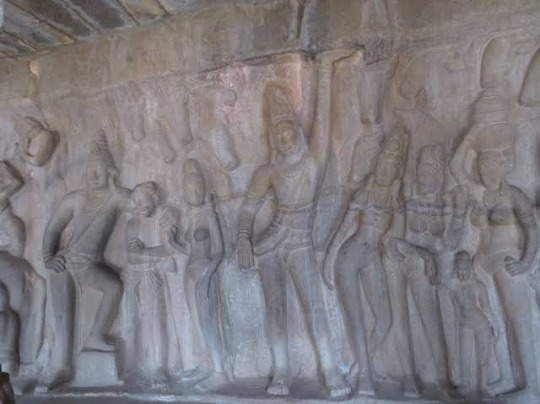
Krishnan lifting Govardhana, Balarama on the right side, consoling an old couple. Nappinnai on the left side gazing at him admiringly, holding the hands of his sister Subhadra.
Aditha Karikalan, Thirukkoilur Malayaman and Parthibendra Pallavan spend their night in this complex near the iconic Shore Temple, at the end of Book 1. The young princes discuss about sculptures and poetry, which Parthibendran finds distasteful. Malayaman leaves them to watch villu pattu in the Pancha ratha complex and it is here that Karikalan narrates the story of his heartbreak. Now it is a closed structure, but originally it was an open air bas relief. The mandapam enclosing it was constructed only in the 16th century, during Vijayanagara period.
An entire chapter (Achchiyar Kuravai) of Silappathikaram is about Nappinnai playing Kuravai dance with Krishan and Balaraman. Manimekalai (Sangham epic, not PS character) too mentions this dance. When Vanthiyathevan gives Aditha Karikalan's letter to Kundavai, Kundavai's retinue is seen dancing to this, singing about various asuras trying to kill Krishnan.
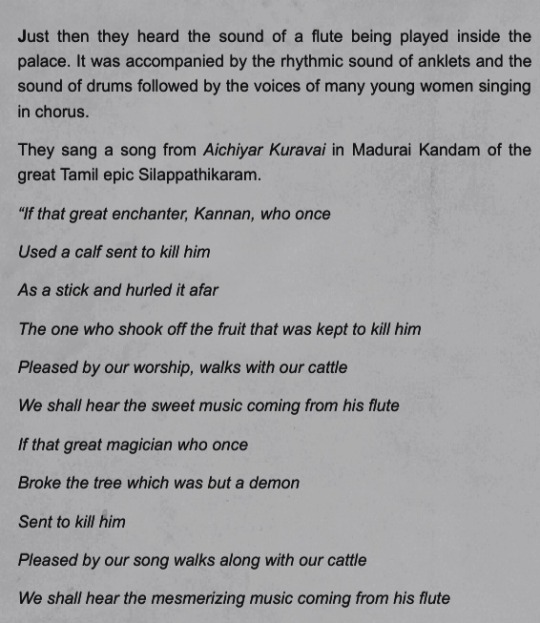
When Karikalan goes to Kadambur, there too we see the preparations for the Kuravai.
While having a heart to heart conversation (as much as someone like Nandini can open her heart), Nandini tells Manimegalai about her hallucinations. According to her, when we love or hate someone intensely, we can see and feel them even in their absence.
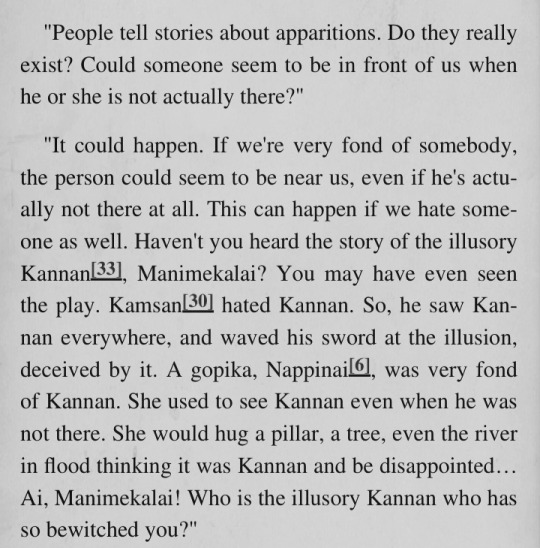
This is something Nandini made up for her consolation, because Nappinnai is never seperated from Krishna. In fact, it said that Vishnu left his divine wives and descended from his seat to be Nappinnai's beloved.
You parted from the eternal Great Flower [Lakshmi] and from the Lady Earth, became a youth, and then united in marriage with the shoulders of the cowherd Pinnai.
In Kuravai Koothu, women sing that Krishna avoids Lakshmi because he is so enamored by Nappinnai.
Is Pinnai of bangled arms so beautiful that He who had won great reputation by measuring the universe, would not look at Lakshmi dwelling in his own breast ?
It is to this Nappinnai that Andal prays to give her an opportunity to get one with Krishna, as her other attempts to wake him up were futile.


Nandini must have heard of the North Indian narratives about viraha unmadini (driven mad by seperation) Radha which were in their infancy then. Nappinnai didn't have the habit of seeing hallucinations - it is Nandini who has mental health issues.
This connection also shows Nandini's guilt about her life's circumstances though they were beyond her control. When Vanthiyathevan tells her that her Krishnan is still waiting for her, she replies that she doesn't deserve it. After marrying Periya Pazhuvettaraiyar, Nandini is never shown praying earnestly - either she is lying about different prayers and austerities or she is using devotion to avoid questions.
Edit: After writing the original post, I thought I will read Thirumangai Alwar's poems because his poetry is specifically mentioned in the chapter which shows Karikalan, Parthibendran and Malayaman going to the port to oversee the loading for goods for Arulmozhi's army. Look what I found:
Pinnai's forehead is a gleaming crescent moon
So long ago in battle he subdued seven bulls for her hand
And now he owns beautiful Kanchi which is surrounded by beautiful cool ponds of waters
Where the sovereign of Pallavas who have the sharp blood stained sword in his hands
Who owns a drum with a bitter mouth
And the Conch with the roar of the sea
Pays his obeisance to his Lord.
(The poem says that the poet's god is the Lord of Kanchi who is worshipped by the Pallava King. The rest are the descriptions of the the god and the king. In PS, crown prince Karikalan is ruling from Kanchi with Parthipendra Pallavan as his vasal)
Very subtle 🤣🤣
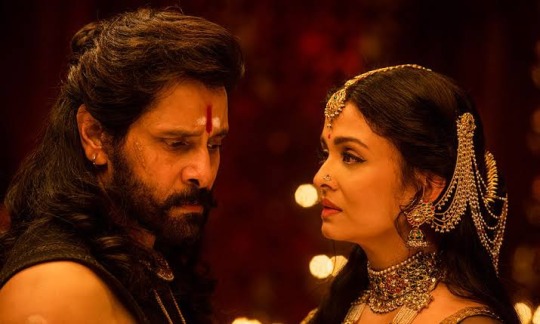
Are you even real, Maya Kanna?
@willkatfanfromasia @sowlspace @vibishalakshman @harinishivaa @thelekhikawrites @hollogramhallucination @thegleamingmoon @whippersnappersbookworm @nspwriteups @jukti-torko-golpo @arachneofthoughts @thirst4light
#ponniyin selvan#ponniyin selvan 2#aditha karikalan#nandini#nandhini#nandini x karikalan#kollywood#ps2#ps1
50 notes
·
View notes
Text
Borrowed love letters (snippet)
Pairing: Lewis Hamilton x blacklatinafem!Reader
Summary: It’s your birthday and Lewis have a few surprises for you.
WC: 687
Warnings: besides sickening sweet love and Lewis being a simp, none, I think.
Author note: I haven’t write anything in a very long time, so please be kind! Also, English is not my first language, and I’m not a 100% fluent in it, so I’ll probably have spilling/writing errors. Constructive (and kind) criticism is received and appreciated.
One of the downsides of dating a writer it’s that it doesn’t matter what I write, it’ll never compare to what you can come up, even in one of your ‘worst’ days, when -and I quote- “writers block is kicking your ass”. So that’s why I’m going to borrow the words of famous writers and poets to try to express my love for you, even though I know words aren’t enough to do so.
Today marks the day that you were brought to this world, a day in which the colors are more vibrant, the birds sing a little more and the sun hides because you outshine it.
Today I will give you 27 gifts, 26 to commemorate each year you have walked this earth, and 1 to celebrate the year you have shared with me (the first of many, I pray).
Today, I borrow the words of Kafka “in a way, you are poetry material; you are full of cloudy subtleties I am willing to spend a lifetime figuring out.”
The first gift is a Rothschild Slipper orchid, one of the most expensive and exotic orchids in the world. As a plant mom, I know that you’ll take amazing care of her (please wait for me so we can name it together). The reason of this being the first gift it’s because I know you have been looking for this orchid for years, and also the fact that it flowers every 15 years is a huge proof of patience, love, perseverance and resilience, all things that I link to you, to who you are. I still remember the afternoon where your parents told me about your birth, that you were born death and the doctors had to bring you back to life, how complicated it was and that you spent your first month of life in hospital. I’m glad that baby you was so stubborn and fought.
The second gift is a vintage cigarette holder. Because your soul feels like an old one, one that has seen and felt and cried a lot, and still maintains the kindness and naiveness of a young one. Your existence is an exquisite mix of contradictions, like a very aesthetic artifact that was originally designed for a purpose, but a dark skinned Latina woman that loves to cook while listen ballenato would stare at and wish that she could put those incredible gorgeous Florasis lipsticks (I also pray for the day that they become cruelty free baby).
The third gift is a reversible sapphire white 14K gold ring, just because as soon as I saw it I thought of you wearing and it was meant to be (don’t worry baby, that engagement ring is in the making).
The fourth gift is a rain cloud diffusor, I knew you have wanted one for months, but haven’t got it because you forgot, or you would rather buy something for someone else (because you are selfless like that).
At 5, you fell in love with what is still today your favorite animal: whales. I still remember the way your face got warm when you told me that at 5 you believed whales could come out of anywhere that had water, including rivers or puddles, so it’s only natural that your fifth gift it’s related to them.
One of my most precious memories it’s almost frizzing myself to death in Alaska just to see whales doing their dance to eat, or as you would call it “the coolest breathtaking and most beautiful method” , I remember all the times you explained to me how whales do the bubble net fishing method, how they work like an orchestra, with the trumpeters, that swim deep and release air to form bubbles and group the shoal, then the one that call the rest so they can go to the surface and eat, while also singing to confuse the fishes, seeing you get excited hearing their songs, the way your eyes illuminated when they appeared right next to our boat, your tears of happiness because you couldn’t believe what you just witnessed warmed me up better than any jacket could.
And even that freezing winter in Alaska it was warmer than the ones I spent without you by my side.
#lewis hamilton imagine#lewis hamilton fanfic#lewis hamilton x reader#lewis hamilton#f1 x reader#f1 imagine#f1 fanfic#f1 fluff#f1 x y/n
95 notes
·
View notes
Text
Madame Putiphar Groupread. Book Two, Chapter XXXV
-𝔠𝔢𝔯𝔠𝔞 𝔮𝔲𝔦, 𝔱𝔯𝔬𝔳𝔢𝔯𝔞𝔦!
{or indirect communication devices between prisonners}
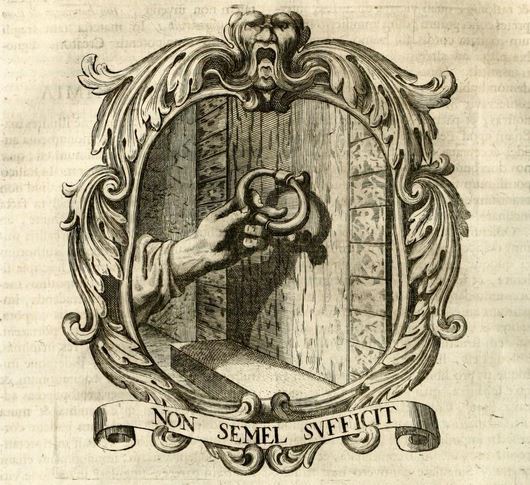
Once is not enough, from Devices heroiques et emblemes, by Calude Paradin (1614)
make sure to read @sainteverge and @counterwiddershins 's posts as well
Our heroine has managed to continue the siege in her room under the threat of suicide. Debby has made a habit of inspecting her room, and one time scanning the woodworks, she finds a graphite scrawl on it saying “cerca qui, troverai” or “search here, you will find”. She introduces her fingers on a gap in the frieze. She is able to remove it, and to introduce her hand in it only to find a small volume of Petrarca (a poet who specialized in Love poems, and whose adressee Laura -fun fact-was a distant relation to the Marquis de Sade)(that's basically all i know about him)
Debby correctly asumes there has to be more than just a hidden book to the mystery but the volume is all she can find, so she sits down to read her favorite sonnets to soothe herself. (Debby was taught italian as a young girl, by her maternal grandfather, unless i am misremembering, so she loves the language because Borel is a Romantic and she -despite being Irish- is a latin coded woman with everything that implies in this era, to this particular writer, but it also echoes those happy childhood days)
and she is correct, there is more to be found. She finds more graphite handwritten words in the blank page before the frontis. The handwriting isn't easy to descipher... since it was surely written in secrecy and perhaps in a hurry. But it also seems metaphorical, one has to make a physical effort to get to the truth, if this is indeed a real testimony by a prisoner. (which I tend to think it is, but given that we've all seen V for Vendetta we probably all suspected this to be a perverse device by the jailers, since as we will see, the testimony aims to bring peace and passivity to the newer captives)
The letter reads as written by a candid and naive woman. The letter is also contradictory, it mentions an imperious need for distractions from suffering, since the writer is a victim of kidnapping and is kept a prisonner who is expected to sexually satisfy a complete stranger who is clearly very powerful; but the letter also expresses immense gratitude for her fortune. All this suffering has led to a fortuitous event. The man is not just any nobleman (as Deborah already suspected, the story about the noble benefactor who would eventually marry her is a lie) he is the King himself, and the person writing the letter is soon to birth a bastard son of the monarch. So she is to be “set free”. And she is happy and grateful for she is, like the narrator says, a madwoman. a poor fool. It is not impossible that the woman and her child were both already killed. It is counterproductive to the regime to have out of control bastards lying around and women blabbing about the secret harem where children and widows are kidnapped.
The writer is also, a fervent catholic, which seems relevant given how we have seen how faith in most cases, makes our heores passive -making Patrick leave everything in the hands of god when he could have taken the initiative and acted earlier- and vulnerable-Deborah lying on the floor in public in a place she is known to frequent, making it easier for the king's men to grab her and kidnap her) Maria degli Angeli, her name or what she was called back in Ferrara, asks her “beautiful stranger”to tear the page off and burn it, which points towards Deborah being the first reader, the first one to find the secret message.
Deborah is obviously destroyed by this touching testimony. She cries for her distant friend, and for herself. This knowledge makes her change strategies. She will interrupt her siege. She will pretend to be “submissive, good and kind and honorable.” She considers herself lucky to be in hands of the king who surely cannot be as perverse as Villepastour (we should not forget how both Patrick and Deborah's first instinct is to assume the royals to be reasonable and honorable people)
this is the madwoman passage I had in mind before before:
“(...)she came to her knees and thanked God for having not abandoned her in her affliction, for having made her aware of the traps set beneath her feet, and begged him to bless the crazy Maria-degli-Angeli, the generous instrument of his will.”
(tr. saintverge)
I find it ambiguous if this “crazy” is part of Deborah's inner monologue or if it's an adition by Borel's ever elusive narrator. "Instrument of his will" definitely seems to be hers so it's an interesting irruption by the narrator because of how un highlighted it is. If Deborah thought her crazy, why would she think herself relatively lucky and blessed after discovering her master is the king himself? As we will see, she will entreat the king and ask him not to force her, to set her free without sexually enslaving her....if she were lucid enough to find Maria crazy, would she have changed her strategy? The siege couldn't last forever anyways. And even without her tendency to idealize monarchs, the posibility that a man who kidnaps women for kicks to be a man open to being reasonable and honorable and letting her go is extremely thin but not impossible.... ... .........
8 notes
·
View notes
Text
THIS DAY IN GAY HISTORY
based on: The White Crane Institute's 'Gay Wisdom', Gay Birthdays, Gay For Today, Famous GLBT, glbt-Gay Encylopedia, Today in Gay History, Wikipedia, and more … January 7


Bayeux Tapestry - hawking
1130 – On this date the medieval poet Baldric Of Dol died (b.circa 1050). He was abbot of Bourgueil from 1079 to 1106, then bishop of Dol-en-Bretagne from 1107 until his death.
Balderic's poetic works were written almost entirely while abbot at Bourgueil. The 256 extant poems are found almost exclusively in a single contemporary manuscript which is most likely an authorized copy. They consist of a wide range of poetic forms ranging from epitaphs, riddles and epistolary poems to longer pieces such as an interpretative defense of Greek mythology. A praise poem for Adela of Normandy describes something very like the Bayeux Tapestry within its 1,368 lines. Two themes dominate his works: desire/friendship (amor)—including paedophiliac—and game/poetry (iocus).
In his collection My Dear Boy: Gay Love Letters through the Centuries, the scholar Rictor Norton publishes Baldric's many letters to male lovers.

1829 – William Maxwell is the last English sailor hanged for sodomy.

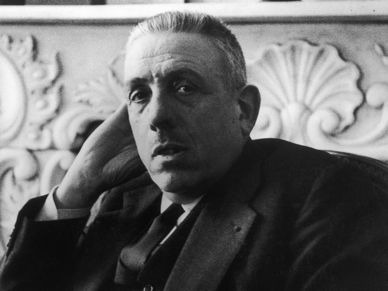
1899 – Francis Poulenc, French composer (d.1963); Poulenc was one of the first out Gay composers. His first serious relationship was with painter Richard Chanlaire to whom he dedicated his Concert champêtre: "You have changed my life, you are the sunshine of my thirty years, a reason for living and working." He also once said, "You know that I am as sincere in my faith, without any messianic screamings, as I am in my Parisian sexuality."
Poulenc also had a number of relationships with women. He fathered a daughter, Marie-Ange, although he never formally admitted that he was indeed her father. He was also a very close friend of the singer Pierre Bernac for whom he wrote many songs; some sources have hinted that this long friendship had sexual undertones; however, the now-published correspondence between the two men strongly suggests that this was not the case.
Poulenc's life was one of inner struggle. Having been born and raised a Roman Catholic, he struggled throughout his life between coming to terms with his "unorthodox" sexual "appetites" and maintaining his religious convictions.
Poulenc was profoundly affected by the death of friends. First came the death of the young woman he had hoped to marry, Raymonde Linossier. While Poulenc admitted to having no sexual interest in Linossier, they had been lifelong friends. Then, in 1923 he was "unable to do anything" for two days after the death from typhoid fever of his 20-year old friend, novelist Raymond Radiguet, Jean Cocteau's lover. However, two weeks later he had moved on, joking to Sergei Diaghilev at the rehearsals he was unable to leave, about helping a dancer "warm up."
In 1936, Poulenc was profoundly affected by the death of another composer, Pierre-Octave Ferroud, who was decapitated in an automobile accident in Hungary. This led him to his first visit to the shrine of the Black Virgin of Rocamadour. Here, before the statue of the Madonna with a young child on her lap, Poulenc experienced a life-changing transformation. Thereafter his work took on more religious themes, beginning with the Litanies à la vierge noire (1936). In 1949, Poulenc experienced the death of another friend, the artist Christian Bérard, for whom he composed his Stabat Mater (1950).
Poulenc died of heart failure in Paris on 30 January 1963 and is buried at the Père Lachaise Cemetery.

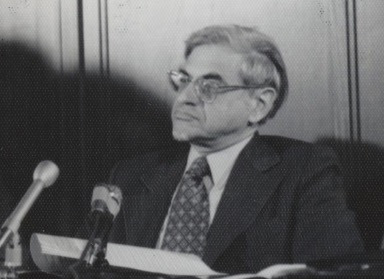
1917 – Alfred Freedman (d.2011), who was responsible for removing homosexuality from the list of mental illnesses, was born in Albany, New York. After earning his undergraduate degree at Cornell University in 1937, Freedman graduated from the University of Minnesota Medical School in 1941. He began an internship at Harlem Hospital but left before completion to enlist in the United States Army Air Corps. He left the service having attained the rank of Major.
After initially studying neuropsychology, Freedman trained in both general and child psychiatry, undertaking a residency at Bellevue Hospital. He became the chief of child psychiatry at the SUNY Downstate Medical Center, a post in which he served for five years, before becoming the first person to serve full-time as the department of psychiatry Chairman at New York Medical College, a post which he held for 30 years.
In 1972, Freedman was approached by the Committee of Concerned Psychiatrists, a group of young reform-minded doctors, who encouraged him to run for the presidency of the American Psychiatric Association. He won the election by 3 votes out of some 9,000 that were cast.
In his position as president, Freedman immediately supported a resolution offered by Robert L. Spitzer to delete homosexuality from the list of mental illness diagnoses. On December 15, 1973, the APA's board of trustees voted 13—0 in favor of the resolution, which stated that "by itself, homosexuality does not meet the criteria for being a psychiatric disorder" and that "We will no longer insist on a label of sickness for individuals who insist that they are well and demonstrate no generalized impairment in social effectiveness."
LGBT rights organizations have hailed this decision as one of the greatest advances for gay equality in the United States. Freedman himself believed that passing this resolution was the most important accomplishment of his one-year tenure as president. A second resolution called for an end to discrimination based on sexual orientation and the repeal of laws against consensual gay sex.
Alfred Freedman died in Manhattan on April 17, 2011, following complications after surgery to treat a hip fracture.


1946 – Jann Wenner is the co-founder and publisher of the music and politics biweekly Rolling Stone, as well as the current owner of Men's Journal and Us Weekly magazines.
In 1967, Wenner and Ralph J. Gleason founded Rolling Stone in San Francisco. To get the magazine off the ground, Wenner borrowed $7,500 from family members and from the family of his soon-to-be wife, Jane Schindelheim. In the summer following the start of the magazine, Wenner and Schindelheim were married in a small Jewish ceremony.
In 1995, Wenner found himself in the middle of a media storm when it was revealed that he was leaving his wife Jane after more than 25 years of marriage and had become involved in a relationship with Matt Nye, a former male model turned fashion designer. Wenner's outing, which may or may not have been at his own instigation, seems to have had little effect on his business empire, but it inspired a number of accusations regarding an alleged "Velvet Mafia" of powerful closeted gay men.
Although it had long been rumored that Wenner's marriage was an "open" one and gossip of his bisexuality was widespread and had been mentioned in gay magazines, in 1995 he was publicly outed—on the front page of the Wall Street Journal, no less—when the newspaper revealed that Wenner had left his wife of 28 years for Nye, a considerably younger man who was a former Calvin Klein underwear model.
Rumors of an alleged conspiracy to suppress the news began to circulate. Several journalists reported that the so-called "Velvet Mafia"—a coterie of powerful media, entertainment, and fashion executives who are reputedly gay—had threatened to pull advertising from any publication that wrote about the breakup.


1977 – John Gidding is a Turkish-American architect, television personality, and former fashion model.
Gidding was born in Istanbul, Turkey to an American father and a Turkish mother. He lived in Turkey until moving to the United States for college after attending Leysin American School in Leysin, Switzerland. He graduated from Yale University in 1999 with a BA in architecture, then the Harvard Graduate School of Design with a Master's in architecture.
At Yale he sang a cappella with The Society of Orpheus and Bacchus, and choral music with the Yale Glee Club, and at Harvard he sang with the Harvard-Radcliffe Collegium Musicum. He was voted one of "Yale's 50 Most Beautiful People" in 1999 by Rumpus Magazine, one of "Boston's 50 Most Eligible Bachelors" by The Improper Bostonian in 2002, one of "Atlanta's 50 Most Beautiful People" by Jezebel Magazine and as one of Atlanta Homes and Lifestyles's "Emerging Talent: Twenty Under 40" in 2008.
He is openly gay and, as of August 2013, married to dancer Damian Smith.
Gidding started modeling in 2000 as a graduate student, performing runway shows for Armani, Gucci, and Hugo Boss before being represented by Wilhelmina Models in New York City. He's also been on the covers of numerous romance novels.
Gidding moved to New York City where he started John Gidding Design, Inc. after working for two years as a landscape architect for Michael Van Valkenburgh Associates.
Gidding's start in television was with the ABC Family TV show Knock First, where he and three other designers took turns making over teenagers' bedrooms. Designed to Sell (Giddings' previous show from 2006 to 2011) was canceled in early 2011 but still airs repeats on HGTV, and Knock First is still running in syndication internationally.
He is currently best known for being the architect-designer on Curb Appeal:The Block where his team spends $20,000 on improvements to the exterior landscaping of chosen homeowners. Less expensive touch-ups are done for 2 or 3 nearby neighbors' homes to improve overall neighborhood property values.


1990 – Michael Sam is an American football defensive end. He attended the University of Missouri, where he played college football for the Missouri Tigers football team for four years. Recruited by a number of colleges, he accepted a scholarship with Missouri. He was a consensus All-American and the Southeastern Conference Defensive Player of the Year as a senior.
Sam is the seventh of eight children born to JoAnn and Michael Sam, Sr. His parents separated when he was young. As a child, Sam watched one of his older brothers die from a gunshot wound. Another older brother has been missing since 1998, and his other two brothers are both imprisoned. A sister who was born before him died in infancy. At one point in his childhood, Sam lived in his mother's car. He was once accidentally maced by police who were arresting one of his brothers.
Sam argued with his mother over playing football, as she did not agree with those pursuits. Sam often stayed with friends while in high school; the parents of a classmate gave him a bedroom in their house and had him complete household chores. Sam is the first member of his family to attend college.
After completing his college football career, Sam publicly came out as gay. If he were to be signed by a National Football League (NFL) team, which analysts think is likely, he would become the first active NFL player to have declared his homosexuality publicly.
In August 2013, Sam took the opportunity of a team introduce-yourself session to inform his Missouri teammates that he was gay, and found them supportive. He avoided talking to the media to avoid addressing rumors of his sexuality. He came out to his father a week before coming out publicly. The New York Times wrote that his father, a self-described "old-school ... man-and-a-woman type of guy", said "I don’t want my grandkids raised in that kind of environment." His father told the Galveston Daily News that he was "terribly misquoted", though The Times maintained that he was quoted "accurately and fairly."
On February 9, 2014, he announced that he was gay in an interview with Chris Connelly on ESPN's Outside the Lines, becoming one of the first publicly out college football players. If he is drafted in the 2014 NFL Draft or signed by an NFL team as an undrafted free agent, he could become the first active player who was publicly out in NFL history. Though he was projected as a third- or fourth-round pick in the NFL Draft, anonymous NFL executives told Sports Illustrated that they expect Sam to fall in the draft as a result of his announcement. Those statements caused National Football League Players Association executive director DeMaurice Smith to respond that any team official who anonymously downgrades Sam is "gutless". From jail, his brother Josh said "I'm proud of him for not becoming like me. I still love him, whatever his lifestyle is. He's still my brother and I love him."
On February 15, Sam returned to Missouri with the Tigers football team to accept the 2014 Cotton Bowl championship trophy at a ceremony held at the halftime of a Missouri Tigers basketball game at Mizzou Arena. It was the first visit to his alma mater since he came out as gay. Anti-gay activist Shirley Phelps-Roper and about 15 other members of the Westboro Baptist Church, an organization widely considered a hate group, protested his appearance. Students organized a counter-protest numbering in the hundreds if not thousands, assembling a "human wall" in front of the protesters.
In May, 2014, Sam was drafted by St Louis Rams. He celebrated with a kiss for his boyfriend Vito Cammisano at an NFL draft party. The kiss went viral.



12 notes
·
View notes
Text
'Of all the fascinating people who came into J. Robert Oppenheimer’s life during his years at UC Berkeley, few are as intriguing — or as tragic — as Jean Tatlock, the woman some believe was the love of his life.
Oppenheimer was 25 when he arrived on the Berkeley campus in 1929 as an associate professor of physics. He moved into 2665 Shasta Road, up the windy, steep hills that flank the university. From the windows, he could see the bay.
The Shasta Road property was always lively. In the main house, Oppenheimer’s landlord Mary Ellen Washburn hosted constant parties; intellectuals roved in and out of the property, debating ideas and drinking late into the night. Oppenheimer objected to teaching before 11 a.m. so he could stay up chatting and smoking.
In the spring of 1936, Oppenheimer met a young woman named Jean Tatlock at one of these parties. He already knew her father, an acclaimed Berkeley professor of Old English; professor John Tatlock enjoyed having lunch with Oppenheimer at the Faculty Club, where Oppie, as he was known around campus, showed off his wide-ranging knowledge of literature and ability to recite passages from memory.
Jean was 22 and brilliant. She was in her first year at Stanford Medical School, studying to be a psychiatrist. This, of course, was highly unusual for a woman in the 1930s, and Tatlock made an impression. Friends and acquaintances recalled she was the type of person everyone noticed when she walked into a room. (Florence Pugh was cast as Jean Tatlock in Christopher Nolan’s “Oppenheimer” movie.)
#OPPENHEIMER will have its French premiere on July 11th at the Grand Rex in Paris. pic.twitter.com/W0o25gL6cy
— Florence Pugh Photos (@pughphotos) June 29, 2023
Oppenheimer, who loved sharp, unconventional women, fell fast. By the fall, the pair were an item, and something of an intellectual power couple. Oppenheimer was the star of the physics department, luring talent from all over the nation to join him. Tatlock was a trailblazing psychiatrist who delighted Oppenheimer with her love of poets like John Donne. “All of us were a bit jealous,” one friend recalled in “American Prometheus,” the definitive Oppenheimer biography.
Their relationship, though, was a tumultuous one. Tatlock went through periods of deep depression, and Oppenheimer was often the person who talked her through them. When she was low, so was he. “American Prometheus” detailed how Robert Serber, a nuclear physicist who met Oppenheimer at Berkeley and became one of his closest friends, watched their relationship unfold.
“He’d be depressed some days because he was having trouble with Jean,” Serber said.
Over the course of three years, they got engaged at least twice, broke things off and kept getting back together. Serber said Tatlock would cut contact with Oppenheimer for weeks or even months. When she returned, Serber said she would “taunt him about whom she had been with and what they had been doing. She seemed determined to hurt him, perhaps because she knew Robert loved her so much.”
In retrospect, it seems clear at least some of this tumult was due to Tatlock’s struggle to understand her own sexuality. In letters to friends, she expressed fear that she might be attracted to women. The thought tormented her — she was then a student of Freudian psychiatry, which maligned homosexuality as a mental defect. Torn between her genuine love for Oppenheimer and her anguished confusion, Tatlock called things off for good in 1939. A year later, Oppenheimer’s new love, a married woman named Kitty Harrison, became pregnant with his child. Her husband agreed to a divorce, and Harrison and Oppenheimer married in 1940.
When a friend asked Tatlock if she regretted not marrying Oppie, she said she did. Maybe she would have married him if she wasn’t “so mixed up,” Tatlock lamented.
But their relationship did not end — and their affair would have profound implications for both of them.
---
Between 1939 and 1943, it’s believed Oppenheimer continued seeing Tatlock several times a year. They still went to parties together in Berkeley, and at least once they got drinks at the Top of the Mark. When she was feeling low, she’d call Oppie and he’d talk to her for as long as it took to see her through the dark moment. In early 1943, he left for Los Alamos to head the Manhattan Project. No one could know the details of his work in the New Mexico desert. Oppenheimer left Tatlock without saying goodbye.
For Tatlock, who relied on Oppenheimer for support, this was a devastating abandonment. He couldn’t explain what had taken him away, and she wrote him pleading letters. By then, she had become a doctor at Mount Zion Hospital in San Francisco (today, it’s part of the UCSF campus). It was an incredible feat of determination in the male-dominated field, but despite her professional success, loved ones knew that Tatlock was not well.
On June 14, 1943, Oppenheimer flew from Los Alamos to see her. Unbeknownst to him, he was being tailed by military officers. In their report to the FBI, they said they watched Oppenheimer take the train from Berkeley to San Francisco, “where he was met by Jean Tatlock who kissed him.” They went to Xochimilco, a Mexican restaurant on Powell and Broadway, and had dinner and drinks. Then, they went back to her top floor apartment at 1405 Montgomery St., a pretty block tucked right underneath Coit Tower. With the spies watching from the street below, the lights went out at 11:30 p.m.
The next morning, Oppenheimer emerged from the flat. They had one last meal together at Kit Carson’s Grill before Tatlock drove him to the airport. He hopped a flight back to New Mexico, and she went home. Soon, FBI Director J. Edgar Hoover had a report about their meeting in his hands.
Both were already on his radar. For much of Tatlock’s adult life, she had been a dues-paying, meeting-attending communist. She even wrote for the Communist Party’s official West Coast publication, the Western Worker. Hoover, with his characteristic paranoia, became convinced Tatlock might be passing nuclear secrets to the Soviets. “It has been determined that Jean Tatlock … has become the paramour of an individual possessed of vital secret information regarding this nation’s war effort,” Hoover wrote in a memo. He had the phone in Tatlock’s Montgomery Street apartment tapped.
There is no evidence Tatlock was any sort of spy, or that she even knew what Oppenheimer was doing at Los Alamos. In 1954, when Oppenheimer was interrogated over accusations he was a Communist sympathizer, he was asked why he flew to see Tatlock in 1943. “Because,” he answered, “she was still in love with me.”
Tatlock’s mental health deteriorated further in the months after their meeting. Around the start of the new year 1944, Tatlock stopped answering her phone. Fearing the worst, her father drove to her apartment on Jan. 4, 1944. He had to climb through an open window to get inside. There, he found his daughter in the bathtub. Jean Tatlock was dead. She was just 29.
Immediately after finding her, her father did an odd thing: He lit a fire and burned her letters and photos. A few hours later, he finally called a funeral parlor. That funeral parlor called police, who arrived at 1405 Montgomery to find a dead woman and a pile of burned paper. Although no one now living knows what those items were, many historians believe it may have been evidence that Tatlock was lesbian or bisexual.
Much has been made of the unusual circumstances of her death over the years, particularly because an autopsy found she’d eaten a full meal before dying. Some believed she was murdered by the government. But Tatlock left a handwritten suicide note and endured a lifetime of clinical depression, so most who knew her best did believe she ended her own life.
Sequestered at Los Alamos, the Serbers received a cable from Oppenheimer’s former landlady at Shasta Road. It informed them that Tatlock had died the day before. Robert Serber rushed to find Oppenheimer and break the news to him before someone else did. He was too late. “Deeply grieved,” Oppenheimer went for a long, solitary walk in the hills surrounding Los Alamos.
“Jean was Robert’s truest love,” Serber said. “He loved her the most. He was devoted to her.”
Tatlock’s family had her remains sent to Albany County, New York, where she was buried in the family plot. Her stone is simple. It reads:
Jean Frances Tatlock
21 February 1914
4 January 1944
---
In 1962, Gen. Leslie Groves, the military leader of the Manhattan Project, wrote to Oppenheimer asking why he had named the first atomic bomb test “Trinity.”
“Why I chose the name is not clear, but I know what thoughts were in my mind,” Oppenheimer replied. “There is a poem of John Donne, written just before his death, which I know and love.”
The poem he quoted was called “Hymn to God, My God, in My Sickness.”
I joy, that in these straits I see my west;
For, though their currents yield return to none,
What shall my west hurt me? As west and east
In all flat maps (and I am one) are one,
So death doth touch the resurrection.'
#Oppenheimer#Jean Tatlock#Florence Pugh#American Prometheus#John Donne#Leslie Groves#Hymn to God My God in My Sickness
34 notes
·
View notes
Photo
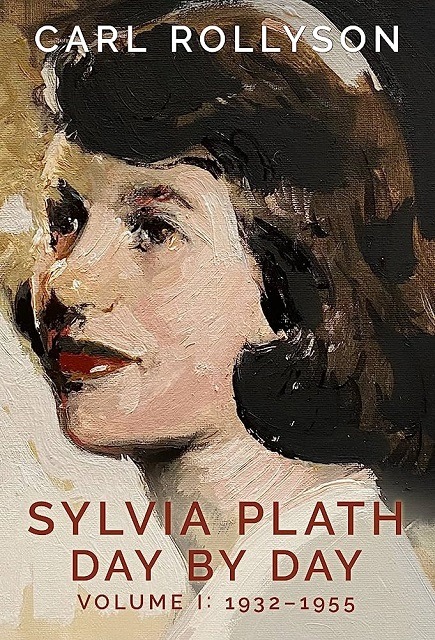
!NEW RELEASE!
Title: Sylvia Plath Day by Day, Volume 1: 1932-1955
Author: Carl Rollyson
Publication date: 15 August 2023
Pages: 400
Publisher: University Press of Mississippi (UPM)
Image source (cover & description): https://www.upress.state.ms.us
About the book:
“A fascinating investigation into the life and art of one of America’s greatest poets
Since Sylvia Plath’s death in 1963, she has become the subject of a constant stream of books, biographies, and articles. She has been hailed as a groundbreaking poet for her starkly beautiful poems in Ariel and as a brilliant forerunner of the feminist coming-of-age novel in her semiautobiographical The Bell Jar. Each new biography has offered insight and sources with which to measure Plath’s life and influence. Sylvia Plath Day by Day, a two-volume series, offers a distillation of this data without the inherent bias of a narrative.
Volume 1 commences with Plath’s birth in Boston in 1932, records her response to her elementary and high school years, her entry into Smith College, and her breakdown and suicide attempt, and ends on February 14, 1955, the day she wrote to Ruth Cohen, principal of Newnham College, Cambridge, to accept admission as an “affiliated student at Newnham College to read for the English Tripos.”
Sylvia Plath Day by Day is for readers of all kinds with a wide variety of interests in the woman and her work. The entries are suitable for dipping into and can be read in a minute or an hour. Ranging over several sources, including Plath’s diaries, journals, letters, stories, and other prose and poetry—including new material and archived material rarely seen by readers—a fresh kaleidoscopic view of the writer emerges.
Reviews
"The details in Rollyson’s Sylvia Plath Day by Day, Volume 1: 1932–1955 are a dream come true for the reader, fan, and scholar of Sylvia Plath. The seeds of so much of her creative writing are present, but Rollyson deftly does not foreshadow how events impact Plath’s life and when she transforms experiences from life to art. He lets each moment stand on its own importance."
"Sylvia Plath Day by Day, Volume 1: 1932–1955 is a must-have book for any reader interested in Plath. Detailed yet highly readable, it paints a portrait of a young woman who would become, as will be chronicled in volume 2, one of the seminal authors in the twentieth century."
"Sylvia Plath Day by Day, Volume 1: 1932–1955 fills the lacunae of existing biographies and uncovers new insights into its subject, as when Plath writes about her experiences at Smith, hearing ‘nasty little tag ends of conversation directed at you and around you, meant for you, to strangle you on the invisible noose of insinuation.’ Or her months in New York at Mademoiselle, which grow less mysterious here. Again, Carl Rollyson has provided us with an indispensable book on Sylvia Plath." “
You can order the book through their website or from other online shops.
#sylvia plath#new release#carl rollyson#sylvia plath day by day#sylviaplath#sylvia plath scholarship#university press of mississippi
28 notes
·
View notes